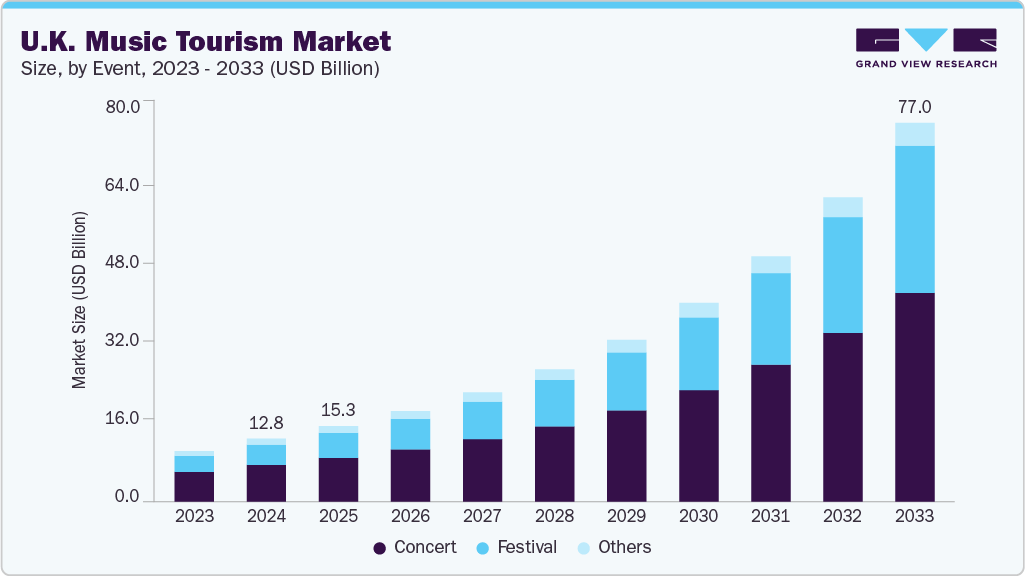UK Music Tourism Market 2033: Connecting Culture and Community
The UK music tourism market was valued at USD 12.82 billion in 2024 and is forecasted to grow to USD 77.03 billion by 2033.
The UK music tourism market was valued at USD 12.82 billion in 2024 and is forecasted to grow to USD 77.03 billion by 2033, reflecting a CAGR of 22.4% from 2025 to 2033. Major cities such as London, Manchester, Glasgow, and Liverpool play pivotal roles, hosting iconic festivals, arena tours, and grassroots gigs that attract both domestic and international music fans.
Historic venues like the O2 Arena and the Royal Albert Hall consistently host sold-out performances by global artists. Meanwhile, cities such as Brighton and Bristol have emerged as key players in the independent music scene and cultural festivals. With rising disposable incomes, pent-up demand post-pandemic, and greater connectivity through rail and low-cost airlines, the audience for live events has grown significantly. In 2023, UK Music reported that over 14.4 million people attended live music events across the country, with particular growth in cities hosting high-profile festivals like Glastonbury, Reading & Leeds, and TRNSMT. The economic impact of music tourism is considerable, with Liverpool alone generating over USD 317.5 million annually from music-related tourism.

Governments and local councils are actively investing in music tourism, recognizing its potential for broader economic growth. The UK Government’s Tourism Recovery Plan has focused on supporting cultural attractions, while city councils have directed funds into upgrading venues and developing festival infrastructure. For example, Manchester City Council allocated funds for the development of Co-op Live, the UK’s largest indoor venue, expected to boost music-driven tourism. Glasgow’s designation as a UNESCO City of Music has also spurred initiatives linking music events with local travel experiences.
The growing trend of experiential travel has led to a shift in consumer behavior, with more visitors planning trips around music events, artist tours, and festivals. Music tourists are increasingly combining concerts with local food, heritage sites, and regional arts, creating more holistic travel experiences. UK tour operators are capitalizing on this shift by offering music-focused packages, such as backstage passes, exclusive merchandise, and themed city tours highlighting landmarks associated with iconic bands like The Beatles and Queen.
Order a free sample PDF of the UK Music Tourism Market Intelligence Study, published by Grand View Research.
Key Market Trends & Insights
- By Event: The concert events segment held the largest market share in 2024, accounting for 58.31%. This dominance is driven by the strong demand for live performances from both domestic and international visitors. Popular events such as Glastonbury, BST Hyde Park, and the BBC Proms attract audiences seeking cultural immersion, social engagement, and iconic performances.
- By Age Group: The 18-34 age group led the market in 2024 with a revenue share of 74.95%. This demographic is particularly drawn to festivals and concerts as gateways to exploring new cities, food scenes, and local cultures. Many young adults, thanks to flexible remote work arrangements and gig economy opportunities, are combining leisure travel with work, making mid-week events and multi-day festivals more accessible.
- By Booking Mode: The online travel agencies (OTAs) segment led the market with a share of 66.28% in 2024. The popularity of online booking platforms, particularly among younger audiences, reflects the growing trend of planning music-related trips through these channels. OTAs provide competitive pricing, package deals, and exclusive access to festival tickets and music experiences, making them a preferred choice for planning trips.
Market Size & Forecast
- 2024 Market Size: USD 12.82 Billion
- 2033 Projected Market Size: USD 77.03 Billion
- CAGR (2025-2033): 22.4%
Key Companies & Market Share Insights
The UK music tourism market is driven by a mix of established promoters and innovative newcomers who are constantly adapting to consumer preferences. These companies focus on delivering high-quality events across a variety of genres, from pop and rock to classical, electronic, and folk music. They enhance live events through cutting-edge ticketing technology, interactive art installations, and locally curated food and cultural experiences. Collaborations with regional tourism boards, hospitality providers, and transport services help extend the reach of these events, while social media campaigns and partnerships with influencers increase visibility.
Strategic collaborations with heritage sites, arts councils, and city branding initiatives enable event organizers to introduce niche events, such as boutique festivals, heritage-themed concerts, and urban music trails, aimed at both domestic and international tourists. By maintaining agile programming and region-specific content, the UK music tourism sector is well-positioned to respond to new trends in experiential travel and cultural engagement, ensuring continued growth in an evolving market.
Key Players
- Ticketmaster
- Glastonbury Festival
- Live Nation (Music) UK Ltd
- AEG Presents
- Festival Republic
- SJM Concerts
- Anschutz Entertainment Group, Inc.
- DF Concerts & Events
- Kilimanjaro Live Ltd.
- Royal Albert Hall
Explore Horizon Databook – The world's most expansive market intelligence platform developed by Grand View Research.
Conclusion
The UK music tourism market is poised for significant growth over the next decade, fueled by rising demand for live music experiences, strategic investments in infrastructure, and evolving consumer preferences for experiential travel. With strong support from both government and local councils, the sector is becoming an increasingly vital pillar of the UK’s tourism industry. As cities and event organizers continue to innovate and diversify their offerings, the UK’s vibrant music scene will remain a key attraction for domestic and international visitors alike, driving substantial economic benefits and cultural exchange.